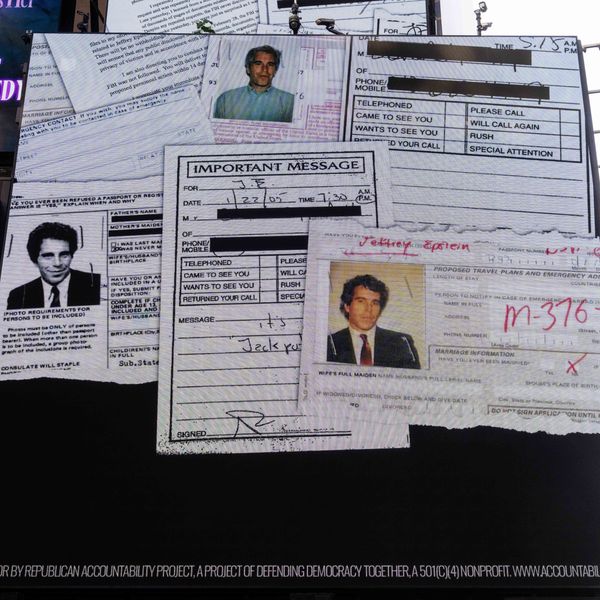The FBI's investigation into Hillary Clinton's use of private email servers turned up no recommendation that she be charged with any crime, but it did offer a reminder of how powerful officials--especially the former secretary of state--are seemingly held to a different standard when it comes to rule of law in general and secrecy laws in particular.
So argued The Intercept's Glenn Greenwald, who noted after FBI director James Comey's Tuesday announcement that "[f]or low-level, powerless Nobodies-in-DC, even the mere mishandling of classified information - without any intent to leak but merely to, say, work from home - has resulted in criminal prosecution, career destruction and the permanent loss of security clearance."
Yet Clinton was protected from such an "extreme, unforgiving, unreasonable, excessive posture toward classified information," Greenwald wrote, "just in time to save [her] presidential aspirations."
Indeed, Comey himself admitted the double-standard, saying: "To be clear, this is not to suggest that in similar circumstances, a person who engaged in this activity would face no consequences. To the contrary, those individuals are often subject to security or administrative sanctions. But that is not what we are deciding now."
Despite finding that Clinton and her team were "extremely careless in their handling of very sensitive, highly classified information"--and that the candidate's repeated claims about her email conduct were false--the FBI cited "the context of a person's actions" and a lack of intent to decide against recommending charges.
"Looked at in isolation," Greenwald said, "I have no particular objection to this decision."
However, he wrote:
[T]his case does not exist in isolation. It exists in a political climate where secrecy is regarded as the highest end, where people have their lives destroyed for the most trivial - or, worse, the most well-intentioned - violations of secrecy laws, even in the absence of any evidence of harm or malignant intent.
[...] Comey's announcement also takes place in a society that imprisons more of its citizens than any other in the world by far, for more trivial offenses than any western nation - overwhelmingly when they are poor or otherwise marginalized due to their race or ethnicity. The sort of leniency and mercy and prosecutorial restraint Comey extended today to Hillary Clinton is simply unavailable for most Americans.
[...] Had someone who was obscure and unimportant and powerless done what Hillary Clinton did - recklessly and secretly install a shoddy home server and worked with Top Secret information on it, then outright lied to the public about it when they were caught - they would have been criminally charged long ago, with little fuss or objection. But Hillary Clinton is the opposite of unimportant. She's the multi-millionaire former First Lady, Senator from New York, and Secretary of State, supported by virtually the entire political, financial and media establishment to be the next President, arguably the only person standing betweenDonald Trump and the White House.
Like the Wall Street tycoons whose systemic fraud triggered the 2008 global financial crisis, and like the military and political officials who instituted a worldwide regime of torture, Hillary Clinton is too important to be treated the same as everyone else under the law.
Shadowproof journalist Kevin Gosztola echoed that charge in his analysis, declaring that "the Clinton case shows how an elite politician running for the highest office in the land can disarm prosecutors simply by being on the cusp of a political party's nomination. It raises serious questions about how laws against the mishandling of classified information are applied, and it begs for pardons to be issued to any lower-level government officials or military officers, who may have engaged in far less significant misconduct than Clinton but were punished."
Gosztola points to National Security Agency whistleblower Thomas Drake and CIA whistleblower John Kiriakou, both of whom were "prosecuted zealously" (and in Kiriakou's case, sentenced to 30 months in federal prison) for arguably lesser offenses.
As Jesselyn Radack, attorney and director of national security and human rights for the Whistleblower and Source Protection Program at Expose Facts, told Shadowproof:
It's a two-tiered system of justice for people who have allegedly mishandled classified information. If you are powerful or politically connected, you have nothing to worry about. But if you're a low-level whistleblower whose made revelations that the government doesn't want people to know about torture, about secret surveillance, about drones, that makes you fair game for prosecution and prosecution for espionage.
And as Michael Sainato notes at Observer, NSA whistleblower Edward Snowden made a similar argument in 2015, saying in an interview with Al Jazeera that if lower-ranking federal employees did what Clinton did, "they would not only lose their jobs and lose their clearance, they would very likely face prosecution."
Meanwhile, Clinton has "repeatedly attacked" Snowden "for being careless with government information," Juan Cole wrote on Wednesday. "So it is ironic that she has been found guilty of being...careless with government information. She, of course, will suffer no consequences, since she is part of the ruling class."
As for Snowden himself, he responded to Tuesday's announcement with a simple emoji that seemed to say, "ummmm, what?"
In June, the whistleblower tweeted:


